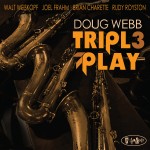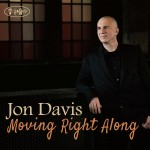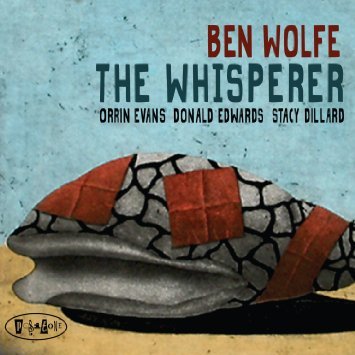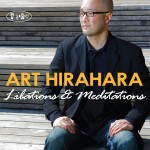Tenor saxophonist Doug Webb has been playing professionally on the West Coast for over 30 years, and has appeared on over 500 recordings. In addition to gigging and performing as a sideman on over 150 jazz albums, he regularly records music for TV and movies—most notably, he provides the saxophone “voice” of Lisa Simpson.
Webb’s relationship with the Posi-Tone label goes back a few years. In 2010, he recorded three albums in one day with a band featuring Stanley Clarke on bass, Gerry Gibbs on drums, and three different pianists: Joe Bagg, Mahesh Balasooriya, and Larry Goldings. Midnight and Renovations were released that year, while Swing Shift came out in 2011.
With 2013’s Another Scene, Webb came East, recording in New York with pianist Peter Zak, bassist Dwayne Burno, and drummer Rudy Royston. And now, he’s teaming up with the drummer again for the new album Triple Play, which comes out March 17. (Pre-order it from Amazon.) The disc also features organist Brian Charette and two more tenor saxophonists:Joel Frahm in the right stereo channel, and Walt Weiskopf in the left.
This is a killer band, and they burn through 11 tracks in an hour here. Charette and Royston have recorded together for Posi-Tone in the past, on guitarist Will Bernard‘s Just Like Downtown and alto saxophonist Mike DiRubbo‘s Chronos. They know how to set up a fast groove that swings so hard it’s almost rock ‘n’ roll, in the vein of tracks by 1950s and early ’60s players like Red Prysock and Don Wilkerson, and the saxophonists all step up to the plate and deliver. It never becomes a honking, bar-walking cutting contest, though; each man shines in the spotlight, but supports the other two at the same time.
Triple Play includes a speedy take on John Coltrane‘s “Giant Steps”; five originals (one by Frahm and two each by Webb and Weiskopf); a tender, midtempo interpretation of Cole Porter‘s “I Concentrate on You”; and the track we’re premiering here, an almost preposterously thick and funky version of Lou Donaldson‘s “Alligator Boogaloo” that’s as much a showcase for Charette as the horns.
—Phil Freeman



 Triple Play – Doug Webb with Walt Weiskopf and Joel Frahm
Triple Play – Doug Webb with Walt Weiskopf and Joel Frahm


 Double bassist Ben Wolfe has worked alongside some of the jazz world’s biggest names, including Wynton Marsalis and Diana Krall. And as he’s done so, he has also forged his own impressive path as a player, composer and bandleader.
Double bassist Ben Wolfe has worked alongside some of the jazz world’s biggest names, including Wynton Marsalis and Diana Krall. And as he’s done so, he has also forged his own impressive path as a player, composer and bandleader.

